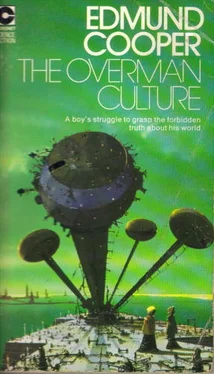Edmund Cooper - The Overman Culture
Здесь есть возможность читать онлайн «Edmund Cooper - The Overman Culture» весь текст электронной книги совершенно бесплатно (целиком полную версию без сокращений). В некоторых случаях можно слушать аудио, скачать через торрент в формате fb2 и присутствует краткое содержание. Город: London, Год выпуска: 1977, ISBN: 1977, Издательство: Coronet Books, Жанр: Фантастика и фэнтези, на английском языке. Описание произведения, (предисловие) а так же отзывы посетителей доступны на портале библиотеки ЛибКат.
- Название:The Overman Culture
- Автор:
- Издательство:Coronet Books
- Жанр:
- Год:1977
- Город:London
- ISBN:978-034017860
- Рейтинг книги:5 / 5. Голосов: 1
-
Избранное:Добавить в избранное
- Отзывы:
-
Ваша оценка:
- 100
- 1
- 2
- 3
- 4
- 5
The Overman Culture: краткое содержание, описание и аннотация
Предлагаем к чтению аннотацию, описание, краткое содержание или предисловие (зависит от того, что написал сам автор книги «The Overman Culture»). Если вы не нашли необходимую информацию о книге — напишите в комментариях, мы постараемся отыскать её.
The Overman Culture — читать онлайн бесплатно полную книгу (весь текст) целиком
Ниже представлен текст книги, разбитый по страницам. Система сохранения места последней прочитанной страницы, позволяет с удобством читать онлайн бесплатно книгу «The Overman Culture», без необходимости каждый раз заново искать на чём Вы остановились. Поставьте закладку, и сможете в любой момент перейти на страницу, на которой закончили чтение.
Интервал:
Закладка:
2
Michael liked being at play school better than he liked being at home. And that was another thing that puzzled him. He felt he should have wanted to be with Mother and Father more.
Play school was a big house in Hyde Park. Every day—except, of course, on Saturday and Sunday—Mother took Michael to school on her bicycle. All the mothers took their children to school on bicycles.
There were lots of children at play school. Some had golden hair, some had brown hair, some had black hair. Some could bleed if they hurt themselves. Michael liked the children who could bleed best of all.
One day he asked a golden-haired child called Virginia if she ever cut herself. Virginia shook her head and ran away, laughing.
Later, Miss Nightingale came and talked to Michael by himself while the other children were sleeping after lunch. Miss Nightingale was very pretty. She had brown hair.
“Michael, why did you ask Virginia Woolf if she ever cut herself?”
“It was a joke, Miss Nightingale.”
“It doesn’t sound like a joke, Michael. Do you ever cut yourself?”
“No,” he lied.
“Why should you want to ask her that?”
Again he lied. “I don’t know.”
Miss Nightingale smiled. “Never mind. The most important thing is to be happy, Michael. Strange ideas can make people unhappy. Try to be like the other children.”
“Yes, Miss Nightingale.”
“Go to sleep, now. This afternoon we shall all have a picnic tea in the park, and we shall play some exciting games, and we shall all be happy.”
“Yes, Miss Nightingale. Thank you.”
Michael’s best friends were Horatio Nelson, Ernest Rutherford, Jane Austen and Emily Bronte. At one time or another, he had seen them all bleed—even if only a little.
Play school was pleasant, but sometimes it could be boring. There was drawing and painting, and acting and singing, and games and sleeping. The teachers told stories, the children told stories, and there were walks in the park.
But most of all, Michael wanted to ask questions. But there never seemed to be much time for questions, because the teachers were always busy organizing some activity or sharing out the toys or putting out the paints; and the children were busy being children, busy being happy by not asking questions. Most of them had already decided that questions were a waste of time. Sooner or later, they thought, they would learn about important things just naturally. Like they learned how to do lots of things that would make them happy but tired, so that they would sleep without having bad dreams.
Michael had bad dreams. He did not tell Mother and Father about them anymore. Bad dreams made Mother and Father think that he was not tired enough to be happy and sleep well.
Sometimes he dreamed that the force field had broken, and then all the German and Japanese and Italian war machines came screaming into the lovely city of London, burning everything and leaving nothing but a great black pit in the earth. Sometimes he dreamed that he was walking, walking, walking—until he fell off the edge of the world, tumbling round and round down a great tunnel of darkness. Sometimes he dreamed that he was completely alone, that London was empty, and that he was the only person who had ever been able to bleed.
The odd child, the child who disappeared, came into Michael’s bad dreams. And remained in his dreams forever. Because, although the little boy disappeared after the incident at play school, Michael was determined that he should not wholly disappear. Now and then, before he drifted off to sleep, Michael deliberately recalled the terrifying scene so that the child whose name he did not know would enter his dreams and be part of him for always.
It had happened one day when the paints were being used, when large sheets of paper had been clipped to all the easels, and when Miss Nightingale had told the children how splendid it would be if they all painted pictures of their fathers and mothers.
The group of children had been painting happily and noisily and messily for a while. Then suddenly the odd child had splashed paint all over his picture, had thrown his brush on the floor and had just stood there, shaking and screaming.
Miss Nightingale had not been in the room when it happened. But she came back very quickly and tried to comfort the little boy.
“What is it, cherub?” she asked gently. Cherub was a favorite word of Miss Nightingale’s. “What has happened? Has somebody been naughty and spoiled your lovely painting?”
“I hate all the children!” sobbed the odd little boy. “I hate every boy and girl! I hate myself!”
“Why?” asked Miss Nightingale. “Why do you have this terrible hate?”
“Because we are not people,” he screamed. “Because we are not real people…. Because none of us can take off our heads!”
Miss Nightingale did not try to reason with him. She did not say anything. She just picked him up very gently and carried him, still kicking and screaming, out of the room.
That was the last Michael ever saw of him.
Later, Miss Nightingale said that the little boy had been ill because he had had too many bad dreams. And she asked everyone to forget what had happened because it was much more sensible to remember good things than bad things. It was thinking about bad things that brought bad dreams and unhappiness.
After several days, hardly any of the children remembered the incident; and even if they did, they remembered different versions.
But Michael remembered. And he promised himself he would always remember. Because, somehow, he knew that it was important to remember the bad things.
Even the dreams.
3
Michael did not know how old he was, but he knew quite a lot about what went on in the world. He learned about what was happening from the news broadcasts on the wireless; and sometimes there were programs on the television, too.
He knew that Britain and America and Russia were at war with Italy and Germany and Japan. He knew that the important cities on both sides were protected by force fields which the bombers and the missiles could not penetrate. He knew that out there in the unprotected parts of the world, people were being hurt and killed and armies were fighting each other. He felt very sorry for people who were not protected by force fields; but Father said that force fields were very difficult to use, and they took a lot of energy, and that was why they only covered the most important cities.
Michael felt very lucky to be living in London, protected by a force field that he could not see.
He liked the city very much. It was clean and quiet and beautiful and safe. He was old enough to explore a little by himself; but he was not yet old enough to use a bicycle. Bicycles were only for the use of older people.
But one day, when Michael was bigger, he would have a bicycle of his own. Father had said so.
But perhaps the war would be over before then, and the force field would no longer be needed. And perhaps the government would allow the cars and buses and trains to come back. He looked forward to that time, and yet he was afraid of it. How could he ever hope to cross a road, with cars and buses hurtling along it, without getting hurt? And yet people and children managed to do this. He had seen them doing it on films and on television programs.
He remembered his first visit to the cinema. It was on a Saturday evening and it was a big occasion. Mother was dressed in a lovely green gown that swept the floor. Father wore a dark suit and a top hat. Michael was bathed and powdered and dressed in his sailor suit.
It was an important occasion because, said Father, they were going to a premiere which would be attended by the Queen.
Читать дальшеИнтервал:
Закладка:
Похожие книги на «The Overman Culture»
Представляем Вашему вниманию похожие книги на «The Overman Culture» списком для выбора. Мы отобрали схожую по названию и смыслу литературу в надежде предоставить читателям больше вариантов отыскать новые, интересные, ещё непрочитанные произведения.
Обсуждение, отзывы о книге «The Overman Culture» и просто собственные мнения читателей. Оставьте ваши комментарии, напишите, что Вы думаете о произведении, его смысле или главных героях. Укажите что конкретно понравилось, а что нет, и почему Вы так считаете.












